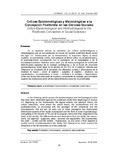Mostrar el registro sencillo del ítem
Críticas epistemológicas y metodológicas a la concepción positivista en las ciencias sociales
| dc.rights.license | http://creativecommons.org/licenses/by-nc-sa/3.0/ve/ | |
| dc.contributor.author | Paredes V., Gustavo A. | |
| dc.date.accessioned | 2009-03-17T21:31:12Z | |
| dc.date.available | 2009-03-17T21:31:12Z | |
| dc.date.issued | 2009-03-17T21:31:12Z | |
| dc.identifier.uri | http://www.saber.ula.ve/handle/123456789/27298 | |
| dc.description.abstract | En el siguiente artículo se presentan las críticas epistemológicas y metodológicas que se han elaborado en contra del modelo positivista desde inicios del siglo XX. Comenzando por la hermenéutica, el empirismo lógico, la teoría cuántica, el racionalismo crítico, más adelante la teoría crítica, el constructivismo y el posmodernismo, concluyendo con el paradigma de la complejidad y de la transdisciplinariedad. Veremos como cada uno de estos paradigmas ha enfatizado determinados aspectos de la realidad (ontológicos) y de la forma de conocerla (gnoseológicos), hasta llegar en la década de los 70 y 80 a proponer visiones que integraron en el estudio de la sociedad, los diferentes niveles y dimensiones de la realidad: lo macro - micro, lo objetivo - subjetivo, lo estático - dinámico, las regularidades - incertidumbres, el orden – conflicto y lo holístico – fragmentario, como una forma más adecuada de explicar y comprender la realidad, que permitiera superar las limitaciones tanto de los interpretativitas como de los positivistas. | es_VE |
| dc.language.iso | es | es_VE |
| dc.rights | info:eu-repo/semantics/openAccess | |
| dc.subject | Probabilidad | es_VE |
| dc.subject | Hermenéutica | es_VE |
| dc.subject | Complejidad | es_VE |
| dc.subject | Positivismo | es_VE |
| dc.title | Críticas epistemológicas y metodológicas a la concepción positivista en las ciencias sociales | es_VE |
| dc.title.alternative | Critics epistemological and methodological to the positivists conception in social sciences | es_VE |
| dc.type | info:eu-repo/semantics/article | |
| dc.description.abstract1 | In the following article appear the epistemological and methodological critics that have been elaborated against the positivism model from beginnings of century XX. Beginning by the hermeneutic, the logical empiric, the quantum theory, the critical rationalism, more ahead the critical theory, the constructivism and the postmodernisms, is concluding with the paradigm of the complexity and the trandisciplines. We will see as each one of these paradigms has emphasized determined aspects of the reality (ontological) and the form to know it (gnoseology), until getting in the decade of 70 and 80 to propose visions that they integrated in the study of the society, the different levels and dimensions from the reality: the macro - micro, the objective - subjective, static - dynamic, the regularities - the uncertainties, the order - conflict and the holistic - fragmentary, as one more a form adapted to explain and to include/understand the reality, that allowed to as much surpass the limitations of the hermeneutics as of the positivists. | es_VE |
| dc.description.colacion | 24-42 | es_VE |
| dc.subject.dependencia | Biblioteca "Aquiles Nazoa" | es_VE |
| dc.subject.dependencia | Servicios Bibliotecarios de la Universidad de Los Andes (SERBIULA) | es_VE |
| dc.subject.facultad | Núcleo Rafael Rangel (NURR) | es_VE |
| dc.subject.keywords | Probability | es_VE |
| dc.subject.keywords | Hermeneutic | es_VE |
| dc.subject.keywords | Complexity | es_VE |
| dc.subject.keywords | Positivism | es_VE |
| dc.subject.publicacionelectronica | Academia | es_VE |
| dc.subject.thematiccategory | Artes y Humanidades | es_VE |
| dc.subject.tipo | Revistas | es_VE |
| dc.type.media | Texto | es_VE |
Ficheros en el ítem
Este ítem aparece en la(s) siguiente(s) colección(ones)
-
Academia - Año 06 - Nº 12
Julio - Diciembre 2007



